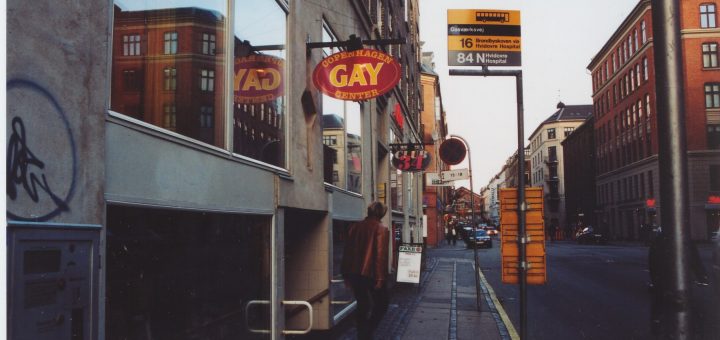The high-pitched sound of the machine, which was occasionally interrupted, served as the backdrop to my conversation with Putu Eka Darmawan, the founder of Rumah Plastik (literally means Plastic House) in Buleleng, Bali, and his colleague Narayana. I visited the Rumah Plastik workshop, where they create boards from recycled plastic waste, on one afternoon last August.
Rumah Plastik is a brand created by Putu Eka Darmawan for his two businesses: the main waste bank located on Jalan Candi Kuning, Banjar Dinas Pondok, Desa Petandakan, Buleleng, and the production workshop for boards made from recycled plastic waste located on Jalan Timor, also in Buleleng.
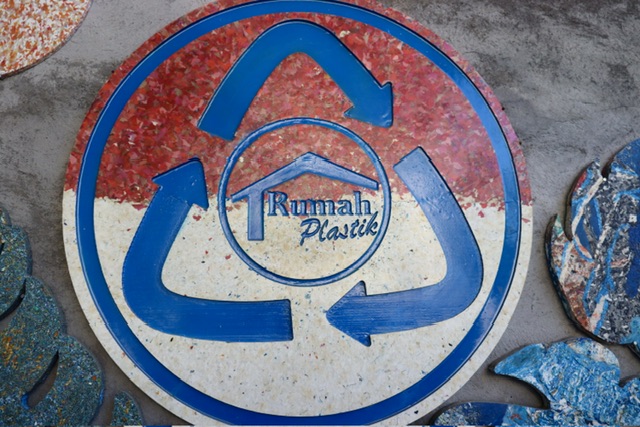
Award from the Ministry of Environment and Forestry
In July 2024, the Main Waste Bank of Rumah Plastik, founded by the man from Buleleng, received an award from the Ministry of Environment and Forestry as the second-best main waste bank at national level for its efforts in reducing waste. Out of 12 assessment indicators for waste bank standardization, the Main Waste Bank of Rumah Plastik only failed to meet one indicator, which is the management of organic waste.
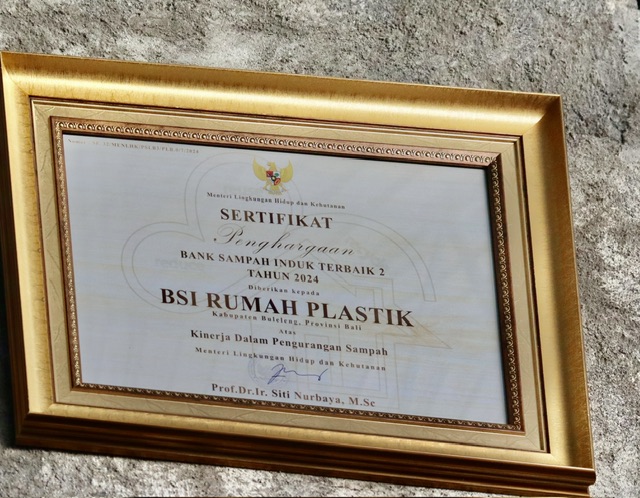
The award for the Main Waste Bank of Rumah Plastik from the Ministry of Environment and Forestry, according to Eka, could not be separated from the previous coverage by BBC Indonesia about Rumah Plastik. To be nominated for a national award, a recommendation must first come from the district before being selected by the province.
The Main Waste Bank of Rumah Plastik is one of two main waste banks in Buleleng Regency. Eka established Rumah Plastik after leaving his job on the Carnival Cruise ship and deciding to return to his homeland in 2016. On the cruise ship, he also learned about waste sorting.
Initially, Eka only collected plastic waste, which he sold to Java Island. With the waste bank scheme, he began to delve into education, empowerment, and innovation. He spent all his savings to establish the Rumah Plastik waste bank. The Main Waste Bank of Rumah Plastik receives waste from the waste banks in the Buleleng area. The collected plastic waste is sorted and weighed. Before being sold to plastic recycling industries, the waste is sorted three times and then packaged.
At this stage, the plastic waste is only counted as sorted plastic waste. “The price of plastic waste in Bali is low, while the transport costs to Java are high, and the selling price is also fluctuating,” said the graduate of Universitas Pendidikan Ganesha, Buleleng. This is what prompted Eka to consider conducting his own downstream processing for recycled plastic products. Thus, he would not have to rely on recycling industries in Java to handle his plastic waste.
Self-Funding, Self-Work
Eka wanted the collected plastic waste to have a higher value. For that, further processing was needed to turn plastic waste into a product (upcycling). Eka required machines such as shredders, dryers, and melting equipment. However, all of this required funding, and since he had no money, he had no choice but to explore many possibilities on his own.

Through YouTube, Eka learned how plastic shredding machines work, and with his resourcefulness, he built a machine by assembling it himself, with the help of a craftsman, of course. It was a challenging process, but after some time, he was finally able to have his own assembled plastic shredding machine.
The workshop where plastic boards are made on Jalan Timor occupies his private land, which also serves as an office where Eka receives guests amid the noise of the production machines. “This is the only independent venture based on a circular economy,” he explains.
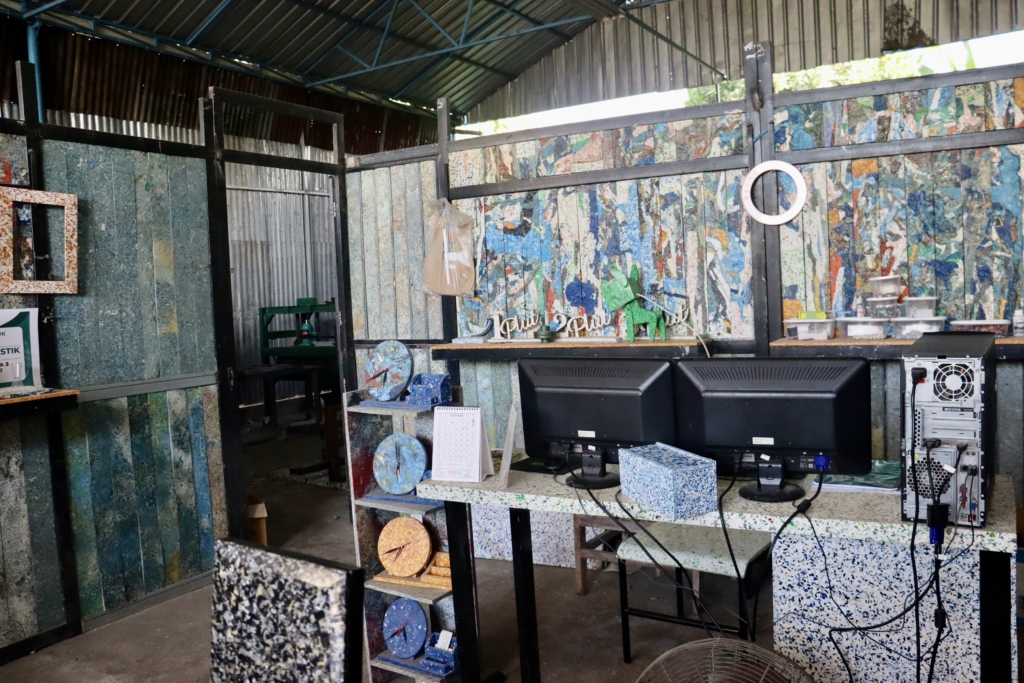
It can be said that Eka is one hundred percent independent in establishing, organizing, and operating both of his ventures. “There is no special budget, no donations or funding from anywhere, and no sponsors,” he adds. Eka even mortgaged his land certificate at the bank as collateral to open the plastic board production workshop.
Rumah Plastik Gives Life
Eka is grateful for the downstream processing he has undertaken. Through his main waste bank, he can fulfill his social responsibilities while running his upcycling activities. Many people rely on the two businesses managed by the 34-year-old man. Currently, Rumah Plastik workshop employs 13 freelance workers who work from 8 AM to 5 PM every day except Sunday. With his self-assembled machines, which include three shredders, one drying machine, one blower, and one melting machine, the Rumah Plastik workshop has produced plastic boards that can serve as an alternative to wood.
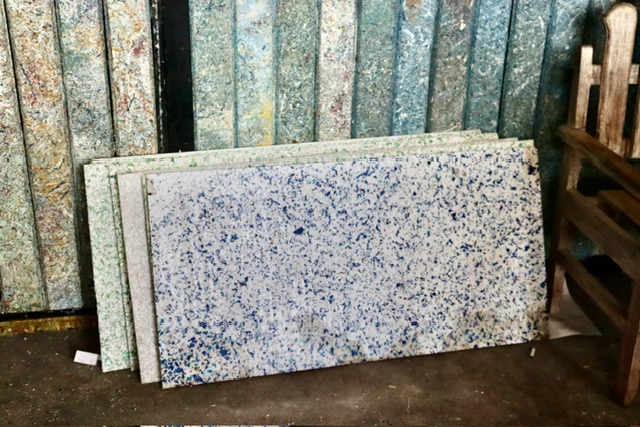
One plastic board measure 1 x 0.5 square meters and is priced at Rp 450,000. The boards come in various colors and can be processed into a variety of products such as furniture, partitions, or other accessories. International buyers, including from Japan, have also placed orders. “We also accept custom orders for furniture made from plastic boards,” Eka adds.

“However, not all plastics have value. Multi-layer sachet packaging, which is produced in large quantities and is the most expensive industrially, is essentially worthless,” Narayana, who has just joined Rumah Plastik for 8 months, explained. Eka also acknowledged that Rumah Plastik has not yet been able to absorb all the plastic waste collected from his main waste bank. “We can only recycle about 30 percent; the rest is sent to industry,” he said. In addition to being made into plastic boards, shredded plastic mixed with other materials can be used for road paving. Buleleng has already paved a 9-kilometer road using plastic waste leading to Pura Segara Rupek in Buleleng.
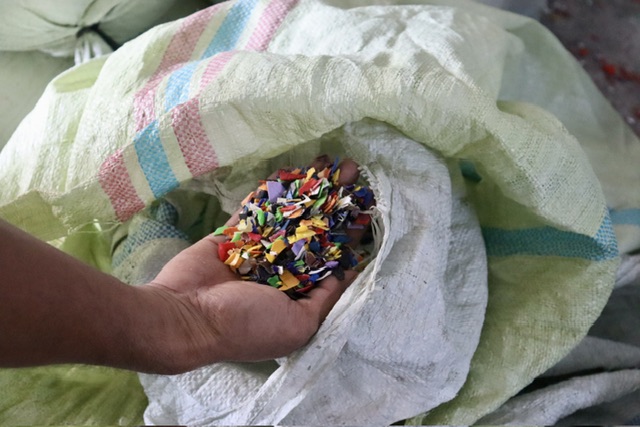
When asked why he focuses on plastic waste, Eka explains that in Bali, scrap metal, paper, and cardboard have already been handled by scavengers. Meanwhile, the issue of organic waste is not as pressing as plastic waste. He believes that Balinese communities living outside urban areas traditionally have their own ways of dealing with organic waste. Generally, their homes have large backyards planted with various crops for daily needs, known as teba. Organic waste is typically disposed of there and becomes compost for surrounding plants. Food scraps are often given to pets like chickens or pigs. In short, in traditional, non-urban communities, the issue of organic waste has been resolved. “However, in urban settlements today, the community’s mindset has changed; trash bins are placed in front of homes, creating an aesthetic mess,” Eka explains.
What Matters Most is Survival
Eka and Narayana are not overly concerned about having to process a large amount of plastic waste. This can be managed if there is a special machine with a capacity to absorb 2 tons of waste, which could automatically produce 200 plastic boards per day. However, the high cost of such a machine prevents Rumah Plastik from acquiring it. Although they dream of owning a machine worth Rp 700 million, Eka and Narayana take pride in their existing machines, despite their limited capabilities. The assembled model of the machines at the Rumah Plastik workshop makes them replicable by others who wish to build similar equipment.
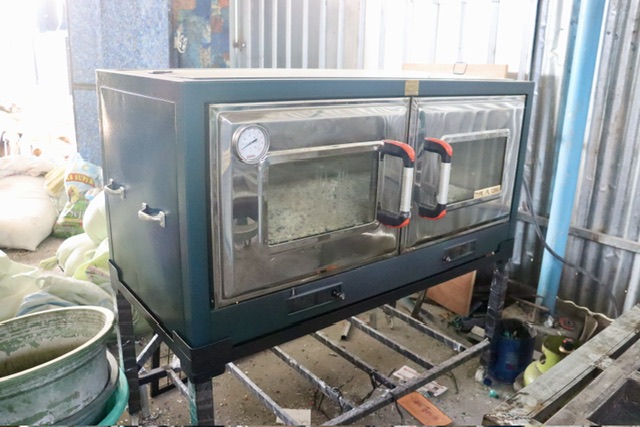
With limited tools and funding, Eka and his team demonstrate that anything is possible with determination and hard work. For this reason, he is willing to share his knowledge and expertise on plastic waste processing or to establish partnerships. Eka admits that it’s not uncommon for people to approach him asking for help in solving plastic waste issues in certain areas. However, he is reluctant to respond to such requests. “They need to understand their problems and learn to solve them. I’m just here to help.” Eka cannot abandon or neglect the two businesses he has built. ‘’ I have people I need to feed,” he adds.
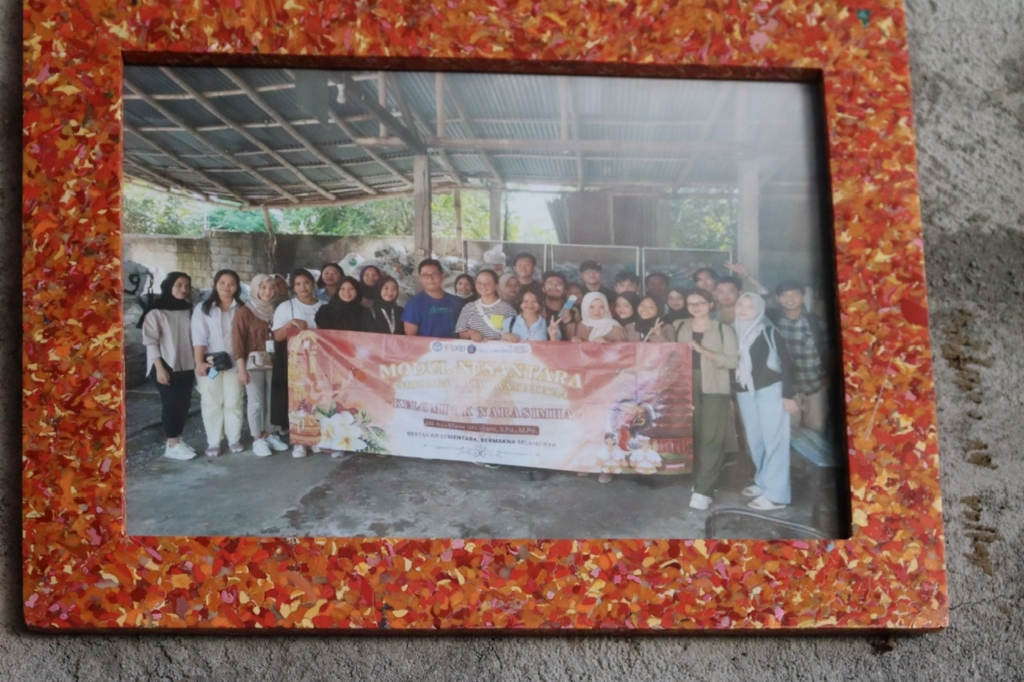
As someone who has worked for a considerable time in waste management, Eka has thoughts on how to handle waste in complex big cities. “Plastic waste comes from industry. Industry must be confronted with industry as well,” Eka asserts confidently. “There should be recycling facilities in big cities. Residents need to pay when disposing of their waste. The waste problem persists because no one is investing in it,” he said.
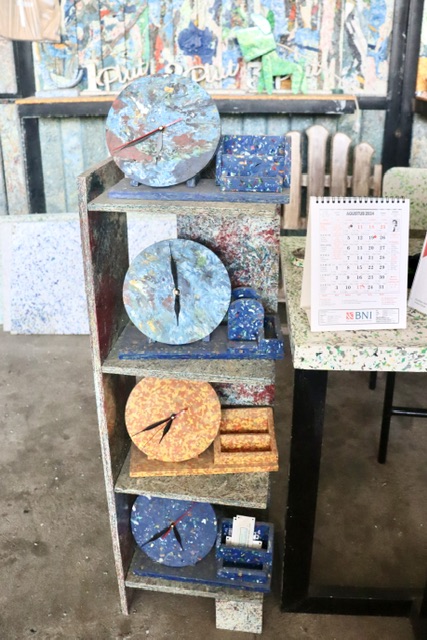
Eka cannot fully rely on the plastic recycling business. The uncertain global situation, such as the Russia-Ukraine War, has affected his venture. This is because the largest market for recycled plastic products is in Europe. Far from the hustle and bustle of tourism in southern Bali, Eka hopes that his products can be used by hospitality businesses or restaurants as furniture or decor. He also plans to collaborate with interior designers to promote his plastic boards.
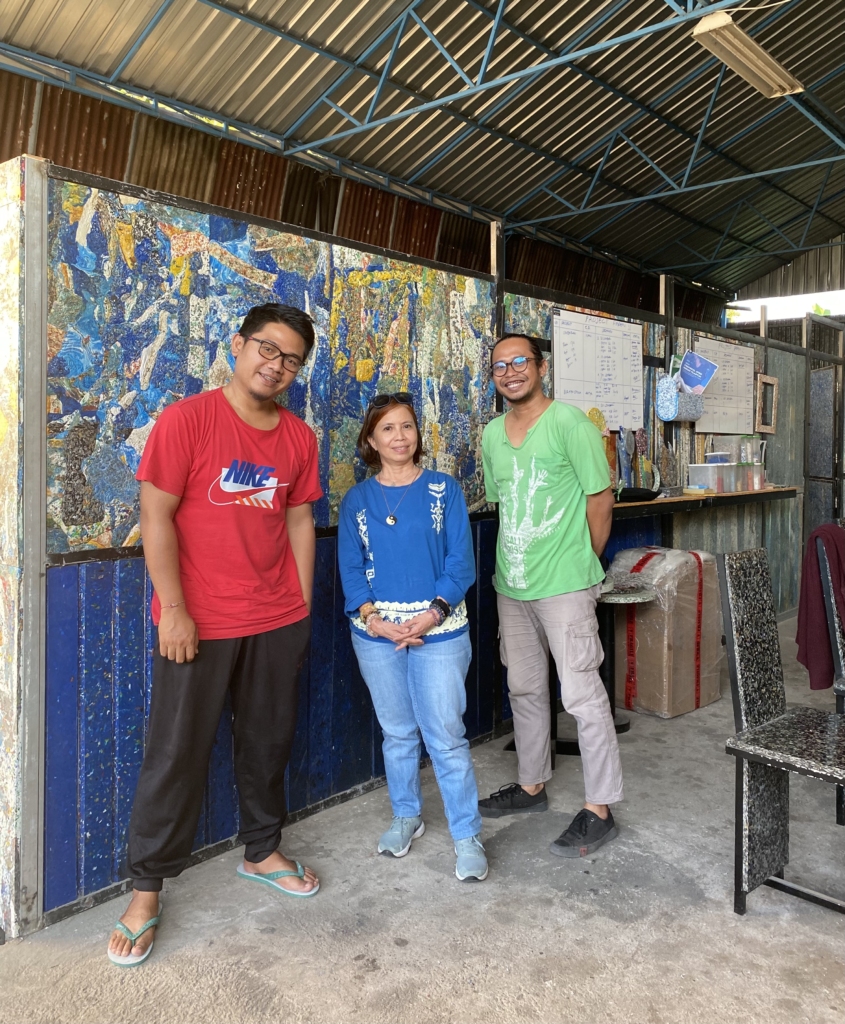
Despite all the limitations and shortcomings, Eka remains consistent in his efforts to downstream the products of recycled plastic waste through Rumah Plastik. “The most important thing for us is to keep on going.”

